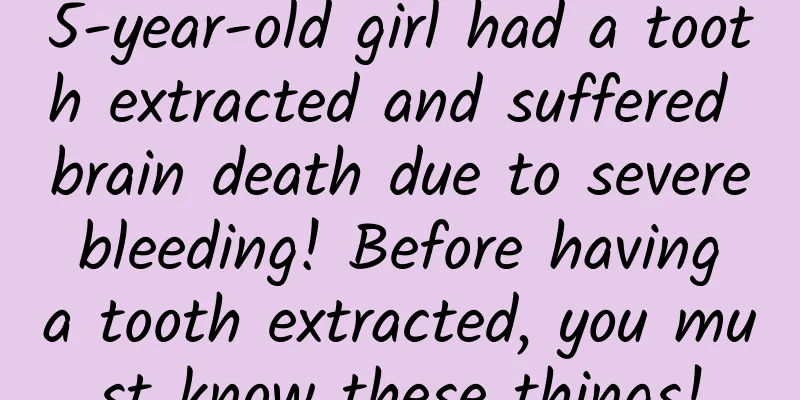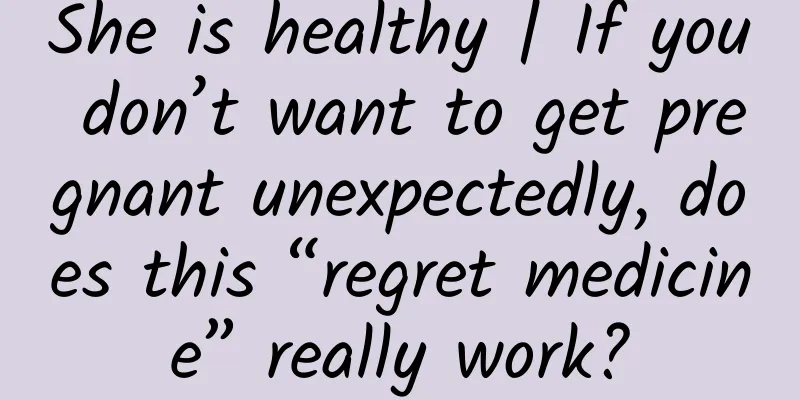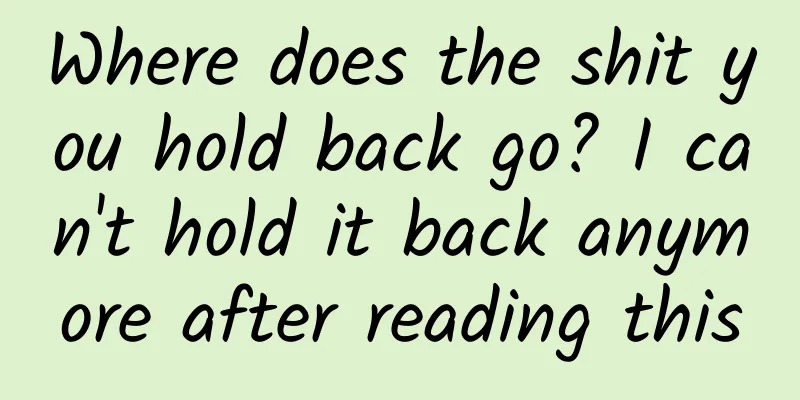5-year-old girl had a tooth extracted and suffered brain death due to severe bleeding! Before having a tooth extracted, you must know these things!

|
Many people know that tooth extraction has risks. Some time ago, a five-year-old girl continued to bleed after having a tooth extracted and was even sent to the ICU ward. She was eventually diagnosed as brain dead, which attracted the attention of many netizens. This makes many people who want to have their teeth extracted feel scared. In addition, they usually have to sign a consent form before having a tooth extracted, which makes tooth extraction even more scary. Having a tooth extracted isn't that scary, but if you need one, be sure to read the following carefully. 1 Why do I need to sign a notice before having a tooth extracted? Tooth extraction is the most common therapeutic operation in oral surgery and is also a basic treatment method that dentists must master. However, tooth extraction is a surgical operation after all, and the oral anatomical structure is very complex. The narrow operating space and limited field of vision will inevitably cause varying degrees of damage to the soft and hard tissues in the surgical area, and are often accompanied by local reactions such as bleeding, pain and swelling, and may cause systemic reactions such as fever, or complications. The patient's daily life after surgery will also be greatly affected. Therefore, a surgery consent form needs to be signed before tooth extraction. Complications of tooth extraction can be mainly summarized into bleeding, accidental trauma, pain and infection: 1. Soft tissue injury: postoperative swelling, bleeding, pain and other symptoms. 2. Bone tissue damage: bone defects, postoperative pain, swelling, etc. 3. Broken roots or tooth displacement. 4. Oral and maxillary sinus perforation. 5. Nerve damage: Nerve damage caused by tooth extraction can cause local numbness and loss of sensation, which may accompany you for life! Once the nerve is cut, it is extremely difficult to recover from the surgery. 6. Bleeding: It is a common complication in oral surgery, but it can easily cause patients to be nervous and cause unnecessary medical disputes. If it is not handled promptly and effectively, it can lead to more serious complications and even endanger the patient's life! However, if the doctor is experienced and the operation is standardized, the bleeding can be stopped in time and the tooth extraction surgery can still be completed smoothly. 7. Pain, swelling, limited mouth opening, infection: If it is the body's physiological reaction to the tooth extraction wound and the secondary process, even if you have a fever, don't worry too much! Follow the doctor's advice, get enough rest, and get enough nutrition, and you will recover. There are many reasons for bleeding, one of which is very dangerous, namely alveolar hemangioma and central hemangioma of the mandible. Patients generally have no obvious symptoms. Some patients, especially teenagers, have a soft, dark red swelling on their gums that bleeds when touched, especially pulsating bleeding! And if the adjacent teeth are loose, be careful of central hemangioma of the jaw! This is a very ferocious disease. Not to mention extracting the affected tooth, even washing the teeth can cause very severe bleeding and endanger life. If doctors take the risks of the above complications lightly, or lack clinical experience and handling capabilities, they may cause great pain to patients or even endanger their lives! 2 Why can't two teeth be extracted at once? Extracting two teeth at one time will take a long time to treat and cause greater damage. For the elderly, children and patients with systemic diseases with weak immunity, there will be different degrees of impact! For example, patients with heart disease, high blood pressure, diabetes, liver or kidney damage may have their disease aggravated if they undergo tooth extraction surgery. Photo courtesy of the author There are high risks in extracting multiple teeth at one time! Because the oral cavity itself is a bacterial environment, if there are a lot of wounds, it is very dangerous for the patient, and it is easy to suffer from bacteremia or even sepsis. After extracting one tooth, it is best to extract the second one four weeks later, but there should be at least a week interval! 3 Why is it best not to have a tooth extracted in the afternoon? 1. A day’s plan begins in the morning. Doctors and patients have better energy and physical strength in the morning! 2. After tooth extraction, the wound will complete the coagulation process in about 30 minutes, but the blood clot is very fragile at this time and needs time to consolidate. If you go home to sleep after having a tooth extracted in the afternoon or evening, the change in body position and the increase in local blood pressure can easily cause bleeding in the wound. The chance of bleeding after tooth extraction in the afternoon may be higher than in the morning. Therefore, it is recommended to rest half-leaning on the sofa after tooth extraction, rather than lying flat! 3. It is recommended to extract high-difficulty teeth in the morning. There is no time limit for extraction of low-difficulty teeth, such as third-degree loose teeth and loose deciduous teeth. 4. If you have experienced repeated inflammation during tooth extraction in the past, it is recommended to have the tooth extracted in the afternoon. This is because the anesthetic effect on such teeth is poor and it may be painful. People are less sensitive to pain in the afternoon, so anti-inflammatory treatment is required before, during, and after the operation according to the doctor's instructions. 5. Most dental departments do not have night clinics or emergency rooms. Tooth extraction in the morning provides ample time for observation and treatment. In case of an accident, it can be handled in time! 4 What should I pay attention to when I want to extract a tooth? In general, try to choose painless anesthesia and minimally invasive tooth extraction. The damage during tooth extraction is directly proportional to the pain, swelling and various complications after surgery! Important things should be said three times: The less invasive, the safer. The less invasive, the safer. The less invasive, the safer. 1. Before tooth extraction: 1. Actively cooperate with the doctor's consultation and provide detailed information about your recent physical condition and previous history of dental disease. 2. Cooperate with the doctor to conduct a comprehensive preoperative examination. 3. Do not extract teeth on an empty stomach. 4. The following are some contraindications for tooth extraction that need to be informed to the doctor: 1) Those with severe cardiovascular disease and hypertension above 160/90 mmHg, and without ECG monitoring equipment during the entire tooth extraction process. 2) People with blood system diseases. If no blood system disease is found, but you are prone to bruises, bleeding from wounds, severe bleeding when brushing your teeth, etc., you must tell your doctor. 3) It is recommended that women avoid tooth extraction during menstruation. During pregnancy, conservative treatment is recommended and tooth extraction should be avoided unless it is an emergency. 4) People who take birth control pills or osteoporosis treatment drugs for a long time must inform the dentist before tooth extraction, because certain ingredients in the drugs will affect wound healing. 5) Others: Patients with systemic diseases such as abnormal thyroid function, poor liver and kidney function, diabetes, malignant tumors, mental illness, colds, systemic infections, etc. need to tell the dentist a detailed medical history. 6) People who are doing strenuous exercise, drinking alcohol, are extremely tired, or have low immunity should not have their teeth extracted. 7) Tooth extraction should not be performed during radiotherapy or within one year after the treatment to avoid radiation osteomyelitis. 8) During the period of oral diseases such as oral ulcers and herpes simplex, teeth need to be extracted after recovery. 9) Teeth located in the tumor area, such as malignant tumors, central hemangioma of the jaw, etc., cannot be extracted. 2. During tooth extraction: From the beginning of anesthesia, if you experience any discomfort, raise your hand immediately and report it to the doctor. When the doctor starts the treatment, you must raise your hand to signal the dentist to stop. Because the tools in the doctor's hands are very sharp, and the drill can drill more than 30w a minute. It is very dangerous to start without warning! 3. After tooth extraction: 1. Drink water and eat 2 hours after tooth extraction, eat cool and soft food, and do not chew on the affected side for 24 hours. Use a spoon when drinking liquids, and do not use a straw. 2. On the day of tooth extraction, do not brush your teeth or rinse your mouth, do not lick the wound, and swallow all saliva and do not spit it out. 3. Stop the bleeding first, then apply ice compress within 48 hours. After 48 hours, when the wound has completely stopped bleeding, you can apply hot compress. 4. Avoid strenuous exercise, do not take hot baths with too high water temperature, talk less, and avoid smoking, drinking, and spicy food on that day. 5. Pay attention to the wound after tooth extraction. If there is a lot of bleeding, you should go to the doctor in time! The gauze or cotton ball on the wound after tooth extraction needs to be bitten for about half an hour before it can be removed (note that it is to be taken out, not spit out). Do not bite too tightly or for too long. It is normal to have a small amount of blood in the saliva within 24 hours. 6. If the wound is sutured, remove the stitches after 7 days. 7. Healthy people generally do not need to take antibiotics when having a tooth extracted, especially when minimally invasive extraction is used. In case of surgical tooth extraction, if necessary, double the dose can be taken half an hour before tooth extraction for preventive treatment. If there is infection and systemic symptoms, it is necessary to take antibiotics under the guidance of a doctor according to the course of treatment. 8. Except for the third molar and supernumerary teeth, adults generally need to install dentures after tooth extraction. The dentures should be repaired about 3 months after the extraction to avoid the adjacent teeth from falling over, which would cause a domino effect in the dentition! Rigorous preoperative evaluation Reasonable surgical planning Clear intraoperative operation Complete postoperative care Minimize the risks and trauma of tooth extraction Escort life safety! Source: Science China (ID: Science_China) Expert of this article: Huang Lu, Director of Helen Dental Center, member of the Chinese Stomatological Association, member of the Standing Committee of the Health Communication Working Committee of the Chinese Medical Doctor Association Producer: Liu Hong, Zhang Lihong Editor: Gui Ting Proofreading: Liang Tiantian and Zhang Linglin |
<<: Why is the voice hoarse after esophageal cancer surgery? Can it be cured?
>>: How to choose fresh abalone? Why is abalone so expensive?
Recommend
Dizziness cannot be blamed entirely on cervical spondylosis! Seven major causes of dizziness, how many do you know?
Little A: "Doctor Zhai, I've been feelin...
What fruits are good for women to eat after miscarriage?
The body is very weak after a miscarriage, becaus...
What is Antweed? What is the use of Antweed?
Ant vegetable is a pure natural wild vegetable, w...
Can women do sit-ups one month after induced labor?
Pregnant women have very low immune systems, and ...
Can pregnant women use hydrating masks?
Everyone loves beauty, especially girls, who pay ...
Breast pain is not swelling or pain, but nipple pain
During pregnancy, the human body will make many c...
Scraping pictures for women on the back
The waist and back of the body are the most commo...
How much pelvic fluid is normal during ovulation?
We know that female friends are prone to various ...
What's wrong with a lump on the vulva?
A lump on the vulva is a common symptom for many ...
A woman dreamed that her sister died
Many people should have this kind of energy. When...
Will people who live according to the “latest research” live healthier lives?
With the accessibility of information channels to...
Causes of dull pain in the left lower abdomen of women
A dull pain in the left lower abdomen is a common...
What are the check-up items for seven months of pregnancy?
The second half of pregnancy is the best time to ...
A man had lower abdominal pain and frequent urination for more than a month, and the examination found that it was caused by "ureteral cyst"
Recently, a 44-year-old middle-aged man went to t...
What is the best medicine for female gynecological inflammation?
In daily life, many women have been troubled by g...









